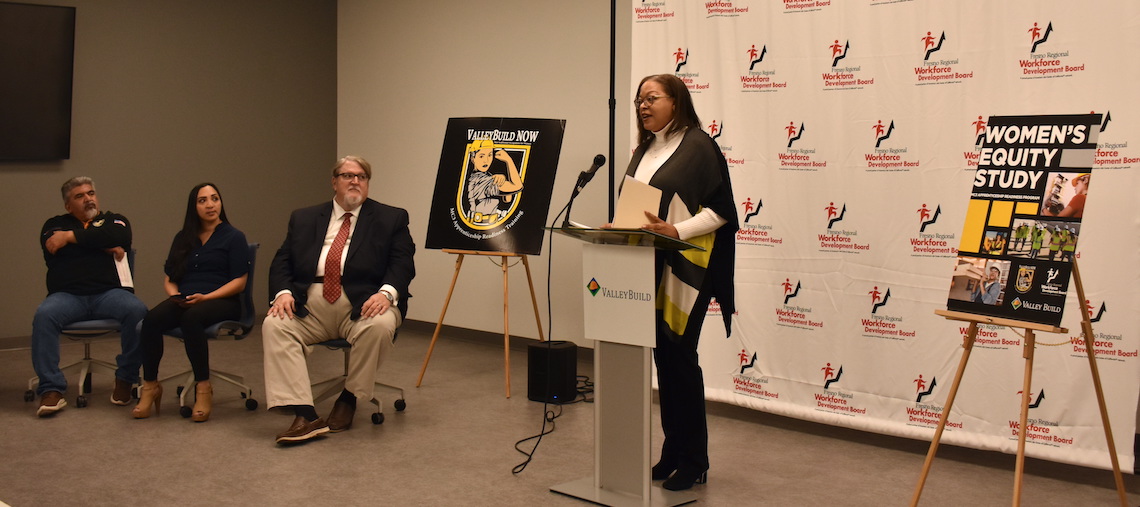
Allysunn Walker speaks at the Women's Equity Study launch Wednesday morning. Photo by Frank Lopez
Written by Frank Lopez
In Celebration of International Women’s Day Wednesday, the Fresno Regional Workforce Development Board (FRWDB) hosted a launch event for ValleyBuild’s Women’s Equity study, which explores strategies to improve the representation of women in the construction trades.
The launch event was held at the Workforce Connection headquarters and featured representatives of the FRWDB, ValleyBuild, an author of the study and a recent apprenticeship graduate.
Operating in a 14-county region, the ValleyBuild MC3 Apprenticeship Readiness Training Program prepares individuals for high-paying and stable careers in the building and construction trades. However, participation by women in the Multi-Craft Core Curriculum (MC3) remains low.
ValleyBuild Non-traditional Occupations for Women (NOW) runs the All Women Cohort and is currently recruiting woman for its next cohort.
With this backdrop, the FRWDB commissioned a research study to better identify obstacles, real and perceived, that might deter women from entering the training program and the trades.
Allysunn Walker, CEO of Walker Community Ventures of Fresno, which offers management consulting expertise for local, regional, and statewide economic development initiatives, is one of the contributing authors of The Women’s Equity Study.
The study had a local focus, Walker said, but it could also be expanded to understand historical injustices around the lack of gender inclusion in the construction trades.
“For decades people of color, and women, have been locked out of union membership and the economic participation and financial opportunities that union membership affords,” Walker said. “Women have been traditionally locked out for a number of reasons, including social attitudes and gender stereotypical perceptions about construction being men’s work.”
The U.S. Bureau of Labor Statistics estimates that the construction and extraction industries employ about 7.7 million workers, only 4% of which are women.
Walker said the study invoked nuanced and thoughtful responses, with the study team providing recommendations that are practical, actionable, and affordable.
To complete the study, the research team interviewed 101 women, consisting of 30 in-person interviews with working trades women and women who applied for and completed the apprenticeship program.
There was an additional survey conducted by email of 71 women with the same background, which included women that were not aware of the program, but who sought opportunities through Workforce Connection.
The study found that seven out of 10 respondents said compensation for completing the program was the biggest barrier. It is unpaid and held 9 a.m. to 5 p.m., five days a week.
Several participants give up full-time and part-time jobs to complete the training but understood the reward at the end of the program.
Nearly a third of those who completed the program said a non-workday schedule would have provided major support.
Most respondents perceived some level of discrimination against women working in the trades. Other barriers include family, childcare and transportation needs.
Blake Konczal, executive director of FRWDB, said having more women involved in the program is important for success.
Konczal said that a $8.9 million Highroad Construction Career Grant from the State of California Workforce Board reserves $3.3 million to pay for training compensation for future cohorts.
“I spend my time looking for money, but this program operates because of the line staff who are interfacing with the trainees every day,” Konczal said.
Ashley Matthews, senior project coordinator with the FRWDB, said that the apprenticeship, and the opportunities after, provide both men and women with great jobs.
“Getting into this career pathway provides a true and sustainable wage that you could raise a family on and have a life and change a future with. We want to make sure that women feel seen and heard and attend a training that puts them in a spotlight that shows them that they are wanted, needed and supported,” Matthews said.
With $47 billion dollars from the federal government that will be coming to the area for infrastructure investment, Matthews said women in the Central Valley are in a unique position for future career opportunities in the trades.








